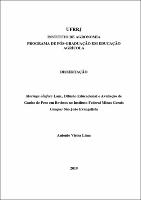Use este identificador para citar ou linkar para este item:
http://rima.ufrrj.br/jspui/handle/20.500.14407/12742| Tipo do documento: | Dissertação |
| Título: | Moringa oleifera Lam., Difusão educacional e avaliação de ganho de peso em bovinos no Instituto Federal Minas Gerais Campus São João Evangelista. |
| Título(s) alternativo(s): | Moringa oleifera Lam., Educational diffusion and evaluation ofweight gain in cattle at the Instituto Federal Minas Gerais Campus São João Evangelista. |
| Autor(es): | Lima, Antonio Vieira |
| Orientador(a): | Sanavria, Argemiro |
| Primeiro coorientador: | Bispo, Charles André de Souza |
| Primeiro membro da banca: | Sanavria, Argemiro |
| Segundo membro da banca: | Paula, José Roberto de |
| Terceiro membro da banca: | Lage, Patricia |
| Palavras-chave: | Desempenho;Feno de moringa;Pecuária;Educação agrícola;Performance;Moringa hay;Ranching;Agricultural education |
| Área(s) do CNPq: | Agronomia Educação |
| Idioma: | por |
| Data do documento: | 11-dez-2019 |
| Editor: | Universidade Federal Rural do Rio de Janeiro |
| Sigla da instituição: | UFRRJ |
| Departamento: | Instituto de Agronomia |
| Programa: | Programa de Pós-Graduação em Educação Agrícola |
| Citação: | LIMA, Antonio Vieira. Moringa oleifera Lam., Difusão educacional e avaliação de ganho de peso em bovinos no Instituto Federal Minas Gerais Campus São João Evangelista. 2019. 63 f. Dissertação (Mestrado em Educação Agrícola) - Instituto de Agronomia, Universidade Federal Rural do Rio de Janeiro, Seropédica, 2019. |
| Resumo: | Com o objetivo de constituir uma área demonstrativa, isto é, um laboratório vivo a ser utilizado com função de consolidar o ensino a pesquisa e extensão, foi implantada no IFMGSJE, nos meses de junho e julho de 2018, uma lavoura de Moringa oleifera Lam. de um (01) hectare em uma área denominada “Demanda”, caracterizada pelo solo plano e fertilidade média. Utilizou-se na semeadura em sistemas adensado 10 kg de sementes, e produção estimada em cem mil (100.000) plantas. Para avaliar o desempenho em ganho de peso os bovinos da raça Girolando foram suplementados com feno de M. oleifera. Os grupos experimentais foram constituídos de 16 bezerras com idade aproximada de 180 dias, com peso corpóreo médio de 127 Kg, e alocadas em quatro tratamentos (T): T1) 0,0%, T2) 0,2%, T3) 0,4% e T4) 0,6%. Estas concentrações expressam a quantidade de feno de M. oleifera, adicionada à quantidade padrão de ração farelada de 2 Kg, em relação ao peso vivo total do animal (PV). O desempenho foi avaliado por meio do ganho de peso; do crescimento corpóreo, via medições da altura da garupa. Adotou-se o delineamento experimental em blocos inteiramente casualizados, com quatro tratamentos e quatro repetições, sendo cada unidade experimental representada por um animal. Os dados organizados de forma acumulativa foram submetidos à análise de regressão não linear através do método iterativo de LevenbergMarquardt. O modelo logístico de três parâmetros foi ajustado para cada tratamento para a estimativa do crescimento acumulado por animal em altura (cm) e peso vivo (kg) em função do tempo, em dias. Optou-se pelo modelo logístico em virtude da sua fundamentação biológica e facilidade de interpretação de seus parâmetros. As maiores estimativas em termos de altura e peso vivo foram verificadas no tratamento T3 (0,4% de feno de M. oleifera). Entretanto, pouca diferença da estimativa de peso vivo aos 60 dias após instalação experimental foi observada entre os tratamentos T3 e T4. O desempenho das bezerras desmamadas foi influenciado positivamente com a adição do feno de Moringa à ração farelada. |
| Abstract: | With the objective of constituting a demonstration area, that is, a living laboratory to be used with the function of consolidating the teaching of research and extension, it was implanted in the IFMG-SJE, in the months of June and July 2018, a Moringa oleifera Lam. plantation of one (01) hectare in an area called "Demanda", characterized by flat soil and average fertility. It was used in the seeding in thickened systems 10 kg of seeds, and estimated production of one hundred thousand (100,000) plants. To evaluate the performance in weight gain, Girolando cattle were supplemented with M. oleifera hay. The experimental groups consisted of 16 calves with an approximate age of 180 days, with a mean body weight of 127 kg, and allocated to four treatments (T1): T1) 0.0%, T2) 0.2%, T3) 0.4% and T4) 0.6%. These concentrations express the amount of M. oleifera hay, added to the standard amount of 2 Kg of meal in relation to the total mass of the animal, or animal live weight (PV). The performance was evaluated through weight gain; body growth, through measurements of croup height. The experimental design was adopted in entirely randomized blocks, with four treatments and four repetitions, each experimental unit being represented by an animal. Data organized in a cumulative manner were submitted to nonlinear regression analysis using the iterative method of Levenberg-Marquardt. The logistic model of three parameters was adjusted for each treatment to estimate the accumulated growth per animal in height (cm) and mass (kg) as a function of time, in days. The logistic model was chosen because of its biological basis and ease of interpretation of its parameters. The highest estimates in terms of height and mass were verified in the T3 treatment (0.4% of M. oleifera hay). However, little difference in the estimated mass at 60 days after experimental installation was observed between T3 and T4 treatments. The performance of demarcated calves was positively influenced by the addition of Moringa hay to the bran feed. |
| URI: | https://rima.ufrrj.br/jspui/handle/20.500.14407/12742 |
| Aparece nas coleções: | Mestrado em Educação Agrícola |
Se for cadastrado no RIMA, poderá receber informações por email.
Se ainda não tem uma conta, cadastre-se aqui!
Arquivos associados a este item:
| Arquivo | Descrição | Tamanho | Formato | |
|---|---|---|---|---|
| 2019 - Antonio Vieira Lima.pdf | 2019 - Antonio Vieira Lima | 1,35 MB | Adobe PDF |  Abrir |
Os itens no repositório estão protegidos por copyright, com todos os direitos reservados, salvo quando é indicado o contrário.

